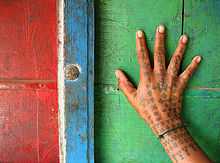Rabari
%2C_f.345v_-_BL_Add._27255.jpg)

Members of the Rabari or Rewari are a Indian community. In the state of Gujarat, they are pastoralists.
The Rabari are also known by other names such as Desai, Raibari Dewasi, Hiravanshi, Rebari, Rebadi and Rayka or Raika and also Maldhari.
Origin
The Rabari myth of origin is that Shiva put them on earth to tend to the camels owned by Parvati.[1]
Demographics
In the semi-desert Kachchh region of Gujarat, they and the Muslim Maldharis are the most significant of the pastoralist communities. In that area they comprise five related groups, being the Debar, Gardo, Kantho, Katchi and Ragad,[2]
Occupation
The traditional Rabari are mainly occupied in the dairy industry. Other communities like them are identified by different names in different regions of the country like Bharwad, Maldhari, Dhangar, Gowda etc. The only commonality is the profession of cattle and camel raising.
They have lived in different parts of India for a millennia. The Rabari are comparatively a very recent migrant. They are part of the Huns (Hunas). Other Rebari tribes also each claim different origins. An example, the Oraon are the earliest inhabitants (Aboriginal) of the Orisa province in south east India. Prior to the arrival of the Aryan tribe or Sanskrit speaking people.
References
Citations
- ↑ Street (2002), p. 29
- ↑ Street (2002), pp. 28-29
Bibliography
- Street, Brian V. (2002), Literacy and Development: Ethnographic Perspectives, Routledge, ISBN 9781134566204
Further reading
- Davidson, Robyn (November 1, 1997). Desert Places, pastoral nomads in India (the Rabari). Penguin. ISBN 978-0-14-026797-6.
- Mirella Ferrera, People of the world. Published by VMB publisher 13100 Vercelli, Italy 2005
- Flavoni, Francesco D'orazi (1990). Rabari: A Pastoral Community of Kutch. Indira Gandhi National Centre for Arts and Brijbasi Printers. ISBN 978-8-17107-026-8.